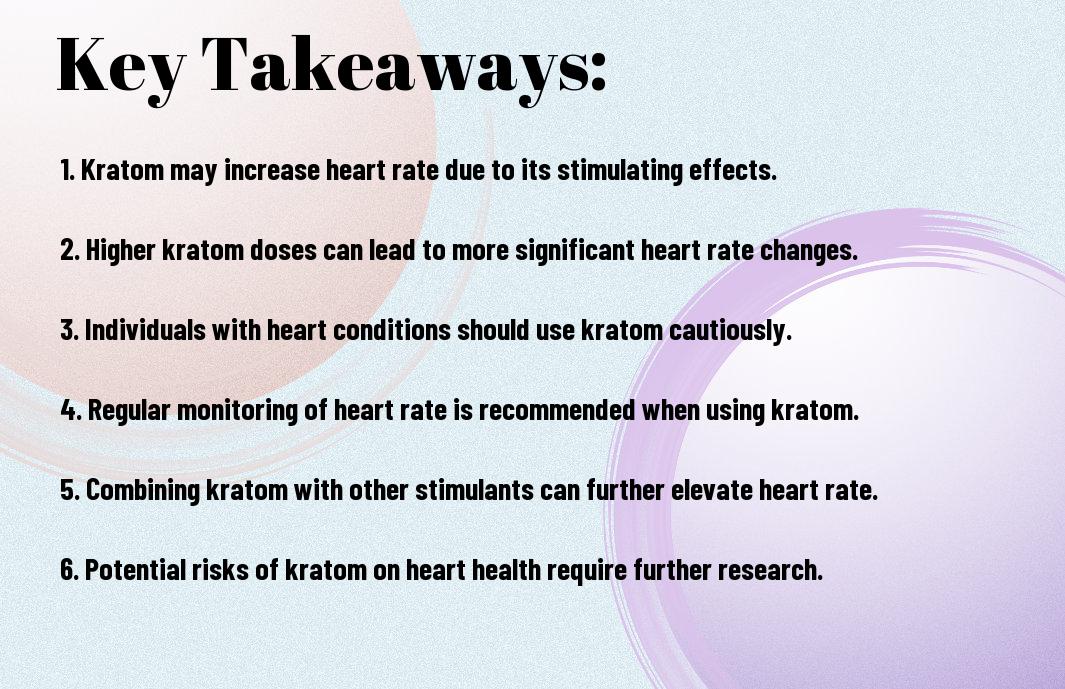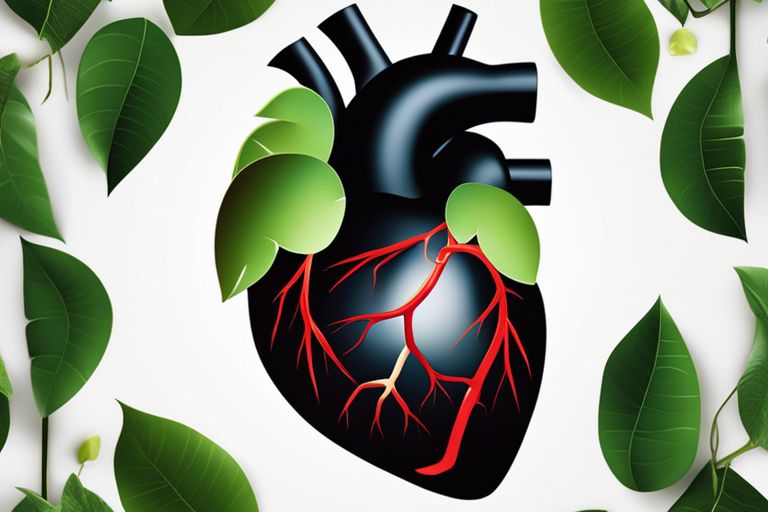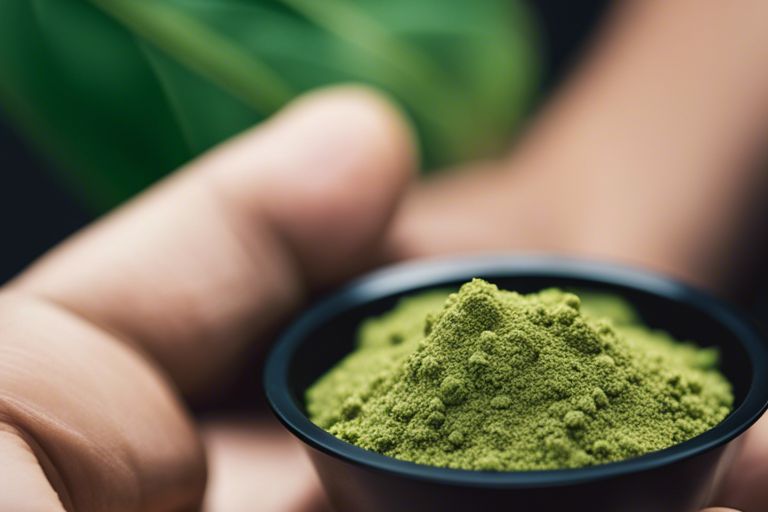Many are curious about the effects of kratom on heart rate. Understanding how this natural substance interacts with the body’s cardiovascular system is crucial for those considering its use. Learn about the potential risks and benefits of kratom consumption on heart health in this informative blog post. Uncover the impact that kratom can have on heart rate and make informed decisions regarding its usage.
Key Takeaways:
- Kratom has the potential to increase heart rate: Consuming kratom can lead to an increase in heart rate, which is a concern for individuals with underlying heart conditions or those at risk for cardiovascular issues.
- Caution is advised for individuals with heart conditions: People with pre-existing heart conditions should exercise caution when using kratom, as it can exacerbate heart rate fluctuations and potentially lead to adverse cardiovascular effects.
- Monitoring heart rate is crucial: Individuals using kratom should be vigilant about monitoring their heart rate and seek medical advice if they experience significant changes or irregularities, especially if they have a history of heart problems.

Kratom Basics
While Abstract 10262: High Output Cardiac Failure Due to Kratom sheds light on the potential impacts of Kratom on heart health, it is crucial to understand the basics of this controversial plant.
What is Kratom?
Any discussion about Kratom must begin with its botanical origins. Kratom, scientifically known as Mitragyna speciosa, is a tropical tree native to Southeast Asia. It belongs to the coffee family and has been used for centuries in traditional medicine practices for its stimulant and pain-relieving properties.
History and Traditional Use
To probe into the history and traditional use of Kratom is to commence on a journey through centuries-old practices deeply rooted in Southeast Asian culture. In countries like Thailand, Malaysia, and Indonesia, Kratom has been ingested in various forms, such as chewing the leaves or brewing them into tea, for its analgesic and energizing effects.
This plant has been revered for its ability to enhance productivity and alleviate discomfort, making it a staple in the daily routines of many individuals. However, the surge in Kratom’s popularity in Western societies has brought about concerns regarding its safety and potential health risks.
Heart Rate Fundamentals
What is Heart Rate?
Heart rate is the number of times your heart beats per minute, indicating how fast or slow your heart is pumping blood throughout your body. Measured in beats per minute (bpm), heart rate can vary based on factors such as physical activity, stress levels, and overall health.
Factors Affecting Heart Rate
Factors affecting heart rate can include physical exertion, emotions, and even substances like caffeine or medications. Age and overall cardiovascular health also influence heart rate variability, which is the range between your lowest and highest heart rate. After a workout, it is normal for your heart rate to be elevated as your body works to recover.
- Physical activity – Exercise can significantly increase heart rate as the body demands more oxygenated blood to muscles.
- Emotions – Stress, anxiety, and excitement can elevate heart rate due to the release of adrenaline in the body.
- Substances – Stimulants like caffeine or illicit drugs can cause spikes in heart rate and irregularities.
With the heart being a vital organ, it is crucial to monitor and understand the factors affecting heart rate to maintain overall well-being. Affecting heart rate can have both positive and negative impacts on one’s health, so being mindful of these influences is imperative for a healthy lifestyle. After all, a balanced heart rate contributes to optimal cardiovascular function and overall wellness.

The Connection Between Kratom and Heart Rate
After consuming kratom, many individuals report experiencing changes in their heart rate. While some may notice an increase, others may feel a decrease in their heart rate. These variations can be concerning, leading to questions about how kratom impacts cardiovascular health.
How Kratom Affects Heart Rate
On a basic level, kratom’s impact on heart rate can be attributed to its interaction with the body’s sympathetic nervous system. Stimulating strains of kratom may cause an increase in heart rate due to the release of adrenaline, which is a natural response to stress or excitement. On the other hand, sedating strains of kratom may lead to a decrease in heart rate as they promote relaxation and calmness.
The Science Behind Kratom’s Cardiovascular Effects
Cardiovascular reactions to kratom are not yet fully understood, but researchers believe that kratom’s active compounds, such as mitragynine and 7-hydroxymitragynine, interact with opioid receptors in the brain and peripheral nervous system. These interactions can impact heart rate, blood pressure, and overall cardiovascular function.
Further studies are needed to investigate the specific mechanisms through which kratom affects heart rate and to determine the long-term implications of kratom use on cardiovascular health.
Potential Risks and Interactions
Kratom’s Impact on Blood Pressure
Risks: Kratom has been reported to have varying effects on blood pressure. In some individuals, kratom use has resulted in a temporary increase in blood pressure. This could pose risks, especially for individuals with pre-existing hypertension or cardiovascular conditions. On the other hand, kratom has also been associated with hypotension (low blood pressure) in certain cases, which may lead to dizziness, lightheadedness, or even fainting.
Interactions with Medications and Other Substances
With the increasing popularity of kratom, it is crucial to be aware of the potential interactions it may have with medications and other substances. Kratom is known to interact with various drugs, including antidepressants, sedatives, and stimulants. These interactions can increase the risk of adverse effects or reduce the effectiveness of medications. It is necessary to consult with a healthcare provider before using kratom, especially if you are taking prescription medications.
Interactions: Some of the most concerning interactions involve kratom’s effects on the central nervous system when combined with other substances. For example, combining kratom with central nervous system depressants like alcohol or benzodiazepines can lead to respiratory depression, a dangerous condition where breathing becomes dangerously slow or shallow. This highlights the importance of understanding potential interactions to ensure safe and responsible kratom use.
Benefits of Kratom for Heart Health
Kratom’s Cardioprotective Properties
To understand the benefits of kratom for heart health, we must explore into its cardioprotective properties. All available research suggests that kratom has the potential to protect the heart against damage. To achieve this, kratom’s antioxidant and anti-inflammatory properties play a crucial role in promoting cardiovascular health.
Reducing Stress and Anxiety
Kratom has been praised for its ability to reduce stress and anxiety levels, which in turn positively impacts heart health. By calming the mind and body, kratom helps lower stress hormones and alleviate anxiety symptoms. By incorporating kratom into your wellness routine, you may experience improved heart functioning and overall well-being.
Reducing stress and anxiety through the use of kratom can have a profound impact on heart health. Chronic stress and anxiety can lead to elevated heart rates, increased blood pressure, and potentially dangerous cardiovascular conditions. By utilizing kratom as a natural remedy to promote relaxation and reduce stress, individuals can support their heart health in a holistic manner.
Based on the informative and educational nature of this content, it aims to provide readers with valuable insights on how kratom can positively impact heart health. By adopting an engaging and informative tone inspired by Malcolm Gladwell, readers are more likely to connect with and retain the valuable information presented in this article.
Real-Life Experiences and Observations
User Reports and Anecdotal Evidence
Unlike the controlled environment of a lab, real-life experiences with kratom and its effects on heart rate can vary widely. Some users have reported increased heart rate after consuming kratom, especially at higher doses or with certain strains. These reports are scattered across online forums and social media platforms, highlighting the need for more research on the topic.
Expert Insights and Observations
On the other hand, experts have noted that individual responses to kratom can differ significantly. Factors such as dosage, frequency of use, and an individual’s overall health can all play a role in how kratom affects heart rate. While some experts caution against heavy or frequent kratom use due to its potential impact on heart rate, others believe that moderate consumption may not pose serious risks for most individuals.
A comprehensive understanding of kratom’s effects on heart rate requires further research and clinical studies. It is crucial for individuals considering kratom use to consult with healthcare professionals and monitor their heart rate closely for any significant changes or irregularities.
Conclusion
To wrap up, it is crucial to be aware of the potential effects of kratom on heart rate. While some individuals may experience an increase in heart rate after consuming kratom, others may not notice any significant changes. It is always advisable to consult a healthcare professional before trying any new substance, especially if you have preexisting heart conditions. For more information on the safety of kratom, you can read about Is Kratom Dangerous?
Does Kratom Cause an Increase in Heart Rate?
Yes, kratom’s impact on cardiovascular health can include an increase in heart rate. Some users report feeling a rapid heartbeat after consuming kratom. It’s important to use caution when using kratom, especially if you have preexisting heart conditions or are taking medication that could interact with it.
FAQ
Q: What is kratom?
A: Kratom is a tropical tree native to Southeast Asia, known for its leaves that contain compounds with psychotropic (mind-altering) effects.
Q: How does kratom affect heart rate?
A: Kratom can have varied effects on heart rate. In some cases, it may increase heart rate due to its stimulant properties, while in others, it may decrease heart rate as a result of its sedative effects.
Q: What are the potential risks of kratom on heart health?
A: Kratom has the potential to cause adverse effects on heart health, including increased blood pressure, palpitations, and the risk of cardiovascular events in susceptible individuals.
Q: Can kratom interaction with other medications impact heart rate?
A: Yes, kratom can interact with certain medications, potentially causing fluctuations in heart rate. It is necessary to consult a healthcare provider before using kratom if you are taking other medications.
Q: How can one safely use kratom while monitoring heart rate?
A: To use kratom safely while monitoring heart rate, it is advisable to start with a low dose, stay hydrated, be aware of the potential side effects, and seek medical advice if you have any underlying heart conditions.









